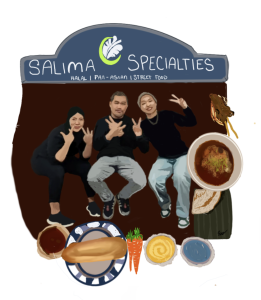32 Nurhaliza Mohmath (she/her)
By Amar Lang (he/him)

Nurhaliza Mohamath was born and raised in the south end of Seattle Washington. She grew up in her Cham community, an Indigenous Muslim minority group. She quickly understood how Indigenous people are often unrecognized in the public or legislative eye. The Cham are originally from Central Vietnam and most of the diaspora reside today in South Vietnam, Cambodia, Malaysia, and the United States. Less than 10,000 as of 2024 reside in the US. This lack of representation inspired Mohamath to work directly within her neighborhood, to create more equitable and diverse food options. Mohamath graduated from Mills college in Oakland in 2022, the first women’s only University in the US. She utilized her degree in business to help her parents, Salima and Assari Mohamath open the only Cham Halal women-owned restaurant in the Pacific Northwest, called Salima’s Specialties. Originally opened in 2009, it was forced to close due to construction of the Seattle Link Light rail station. The second iteration of the restaurant highlights pan Asian street food such as pho, curry, and satay skewers. In Skyway, Washington, near a high density of Cham people, the restaurant is a space where Cham’s can be represented, a feeling which is rarely felt.
Across the world, farmers are the most exploited workers. Mohamath, as the food justice coordinator for the Rainier Beach Action Coalition (RBAC) works directly with Black, Brown, Indigenous and other people of color farmers and advocates to support them. South Seattle has a grim past of redlining and gentrification in the neighborhoods, perpetuating food insecurity. She can be seen as a mediator for policy change for farmers. She works with them on a personal level, listening to what they need whether that is equipment or grants. Through RBAC, they have purchased over $100,000 in locally grown produce from these farms. They then distribute it back to Rainier Beach and surrounding neighborhoods with farm stands, all for free. The farm stands provide unique produce such as daikon, napa cabbage, bok choy, okra, rare corn strands, and more. Community members rarely can get these crops at a typical grocery store.
The youth in Rainier Beach are an important aspect of Rainier Beach Action Coalition. Mohamath takes pride in working with high school student volunteers. She likes to call them ‘farm days’, where they take the kids on trips to the same BIPOC farms. Witnessing kids participate in work which benefits their own community is important for Mohamath and RBAC. Restorative justice circles are also facilitated for the kids, a practice adopted by Native Americans. They are a way of resolving conflict through healthy conversation.
The restaurant and food justice work Nurhaliza is involved with is tied to honoring her Cham identity. As an Indigenous woman, she understands if she is not doing the work to help her community, or being a voice for her people, no one else will. Her agency for change has inspired her to support not only Cham people but other marginalized communities in South Seattle.

